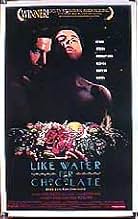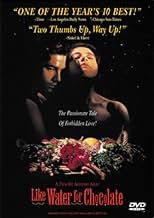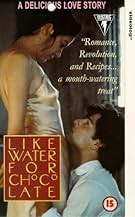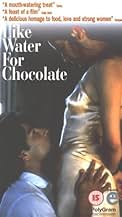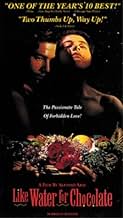VALUTAZIONE IMDb
7,1/10
19.841
LA TUA VALUTAZIONE
Dopo che l'uomo che ammira sposa la sorella, una giovane messicana riversa il suo amore nella cucina, scoprendo di poter trasferire le proprie emozioni grazie al cibo che prepara.Dopo che l'uomo che ammira sposa la sorella, una giovane messicana riversa il suo amore nella cucina, scoprendo di poter trasferire le proprie emozioni grazie al cibo che prepara.Dopo che l'uomo che ammira sposa la sorella, una giovane messicana riversa il suo amore nella cucina, scoprendo di poter trasferire le proprie emozioni grazie al cibo che prepara.
- Nominato ai 1 BAFTA Award
- 27 vittorie e 14 candidature totali
Recensioni in evidenza
Like Water for Chocolate is a masterpiece in that it conveys the essence of our ancestors' knowledge forgotten in the fast pace of modern living.
It centers around the wonder of cooking: a sacred ritual, not a boring chore; and when done right, with love, it creates magic. Raised and taught to cook by her old Mayan nanny, Tita (exquisitely performed by Lumi Cavazos) masters the near-magical ability of transferring her love and other feelings into her creations passed into one who eats them.
The characters senses are so refined, they enable everyone involved in this family drama to be tuned to the finest nuances of their world, opening the door to non-material pleasures. Rich with metaphors, their language reflects the skills of keen and sometimes humorous observation. The story brings our perception to a different level - as its characters' empathy borders on miracles and magic, and things we only sense and feel become real. Tita's virgin breasts, feeling `like dough kneaded' by strong hands, turn into mature breasts under Pedro's burning eyes (to later start lactating) - their glances, just like her food, becoming the means of communicating their forbidden love.
Yet all magic becomes wasted in the face of a man's choice. The Universe may scream into Pedro's ears about the path he is to take, but if he doesn't follow it, no magic can save him. We witness the story of a fatal attraction between two soulmates, whose passion, confined by an enslaving family tradition, lights up everyone around them... But for themselves, it's so intense, it literally engulfs the lovers in flames. Did they have an alternative? It is for the viewer to figure out.
You may ponder, however, over the young doctor's Indian grandmother saying that `each of us is born with a box of matches inside but we can't strike them all by ourselves; we need oxygen and a candle to help. The oxygen would come from a lover's breath; the candle could be a food, a melody, a word, a caress, or a sound...' He remembers her warning, though, that `it is important to light the matches one at a time' because otherwise the heat generated would produce too dazzling a brilliance.
Thus the wisdom of the ages, just like the power, is passed here through women and the men who are in tune with them. And the intense interactions between the colorful characters of five generations extend to dead family members who continue to counsel or despise the living.
When coming into her room with Pedro after 22 years of their waiting for each other, Tita is greeted by her long deceased nanny lighting her bed and the room with multiple candles. And the consequences of one's actions carries on beyond time - as each person continues her path notwithstanding death.
Hot yellow-red colors intermixed with dense lighting rekindle one's passion for living and appreciation for the gifts and mysteries of the Mexican land. The magic realism becomes a way of living in a culture connected with its heritage.
I recommend Like Water for Chocolate to anyone who feels like he/she is lacking color and passion in life - if watched with an open mind and heart, this beautiful and enigmatic film will stir your senses and imagination and light up your box of matches!
It centers around the wonder of cooking: a sacred ritual, not a boring chore; and when done right, with love, it creates magic. Raised and taught to cook by her old Mayan nanny, Tita (exquisitely performed by Lumi Cavazos) masters the near-magical ability of transferring her love and other feelings into her creations passed into one who eats them.
The characters senses are so refined, they enable everyone involved in this family drama to be tuned to the finest nuances of their world, opening the door to non-material pleasures. Rich with metaphors, their language reflects the skills of keen and sometimes humorous observation. The story brings our perception to a different level - as its characters' empathy borders on miracles and magic, and things we only sense and feel become real. Tita's virgin breasts, feeling `like dough kneaded' by strong hands, turn into mature breasts under Pedro's burning eyes (to later start lactating) - their glances, just like her food, becoming the means of communicating their forbidden love.
Yet all magic becomes wasted in the face of a man's choice. The Universe may scream into Pedro's ears about the path he is to take, but if he doesn't follow it, no magic can save him. We witness the story of a fatal attraction between two soulmates, whose passion, confined by an enslaving family tradition, lights up everyone around them... But for themselves, it's so intense, it literally engulfs the lovers in flames. Did they have an alternative? It is for the viewer to figure out.
You may ponder, however, over the young doctor's Indian grandmother saying that `each of us is born with a box of matches inside but we can't strike them all by ourselves; we need oxygen and a candle to help. The oxygen would come from a lover's breath; the candle could be a food, a melody, a word, a caress, or a sound...' He remembers her warning, though, that `it is important to light the matches one at a time' because otherwise the heat generated would produce too dazzling a brilliance.
Thus the wisdom of the ages, just like the power, is passed here through women and the men who are in tune with them. And the intense interactions between the colorful characters of five generations extend to dead family members who continue to counsel or despise the living.
When coming into her room with Pedro after 22 years of their waiting for each other, Tita is greeted by her long deceased nanny lighting her bed and the room with multiple candles. And the consequences of one's actions carries on beyond time - as each person continues her path notwithstanding death.
Hot yellow-red colors intermixed with dense lighting rekindle one's passion for living and appreciation for the gifts and mysteries of the Mexican land. The magic realism becomes a way of living in a culture connected with its heritage.
I recommend Like Water for Chocolate to anyone who feels like he/she is lacking color and passion in life - if watched with an open mind and heart, this beautiful and enigmatic film will stir your senses and imagination and light up your box of matches!
The two things that stood out for me in this film are the telling of this story and how you had no idea what was going to happen next and of course the performance of Lumi Cavazos. Its one of those rare experiences that stay with you long after you have seen the film. Both strong and self assured. Whats really amazing is that its Cavazos first film role (That I know of, anyway) her natural charm is essential to this story. Not a film for all taste's but a very unique movie overflowing with romantic grandeur.
I'm greatly surprised at some of the negative comments for "Like Water for Chocolate", many of which state how it utterly failed to capture the passion or the mystical tone of Laura Esquivel's book.
I suppose it's only a matter of opinion(like pretty much everything, I guess), but I thought the movie represented the book's magical realism in a great way. The filmmakers knew not to exaggerate or take everything over the top(which could've been very easy), and this gives the fantastical moments-- such as all the guests becoming ill at the wedding or the shower bursting into flame as Gertrudis bathed-- an essential grounding in reality. This fact is also buttressed by the erotic musical score and the whole cast, who fit the characters from the novel perfectly IMO.
I would recommend giving the film of "Like Water for Chocolate" a go; and trying out the book as well.
I suppose it's only a matter of opinion(like pretty much everything, I guess), but I thought the movie represented the book's magical realism in a great way. The filmmakers knew not to exaggerate or take everything over the top(which could've been very easy), and this gives the fantastical moments-- such as all the guests becoming ill at the wedding or the shower bursting into flame as Gertrudis bathed-- an essential grounding in reality. This fact is also buttressed by the erotic musical score and the whole cast, who fit the characters from the novel perfectly IMO.
I would recommend giving the film of "Like Water for Chocolate" a go; and trying out the book as well.
Years ago, in California, I walked into a gas station convenience store to buy some consumable or other. The man who took my money was a Mexican emigre, and he saw that I was carrying a copy of the book Like Water for Chocolate by Laura Esquivel. He asked how I liked it, and I told him I was loving it. He told me not to miss the movie.
"Oh," I answered, "but I always worry that the movie will never be as good as the book."
"It doesn't matter," he told me. "This is a very great film. And it is the first real Mexican film I have ever seen shown in this country. You know, to everybody, not just the Mexican community."
I smiled and told him I would check it out, but honestly, I had no idea what he was talking about. After all, I knew who Dolores Del Rio and Cantinflas were, and the movies with them that I had seen were shown in L.A., to everybody.
But now, at last, I have seen this movie, and now, at last, I know what this guy was talking about. Like, wow! This really is a real Mexican film! Art! Cinema! More than just a bit of popular fluff!
Tender, compassionate and very witty, like the book on which it is based, this movie celebrates Mexican culture -- not just on the food, the preparation of which forms the premise of the story, but as kind of a rollicking take on the history of the young country at the turn of the century. It celebrates the music, the style of life on a ranch, the strength of the extended family, the beauty of the land, and the ethnic mixing pot that is every Mexican.
There is so much reckless joy and passionate love in this film, even when it portrays pain. It openly depicts female eroticism. (Plus, for a big change from US cinema, we get to see beautiful men and women of many shapes, sizes and colors all on the same screen.) The acting is flawless, and the star, Lumi Cavazos, is absolutely charming, full of life and credibility.
The only flaws I found in this film were minor and had to do with timing. For example, the final ascent to the climax seems to have been shortchanged a little bit. I would have liked to reach through this scene a little more slowly.
To judge Mexican cinema by the type of films I had seen before this one would be like judging U.S. cinema on the basis of Jerry Lewis or some cheesy melodramas from the '40s and '50s, but not taking into account any of our real film art. I'd love to know what else I've missed. Can't wait to find out.
"Oh," I answered, "but I always worry that the movie will never be as good as the book."
"It doesn't matter," he told me. "This is a very great film. And it is the first real Mexican film I have ever seen shown in this country. You know, to everybody, not just the Mexican community."
I smiled and told him I would check it out, but honestly, I had no idea what he was talking about. After all, I knew who Dolores Del Rio and Cantinflas were, and the movies with them that I had seen were shown in L.A., to everybody.
But now, at last, I have seen this movie, and now, at last, I know what this guy was talking about. Like, wow! This really is a real Mexican film! Art! Cinema! More than just a bit of popular fluff!
Tender, compassionate and very witty, like the book on which it is based, this movie celebrates Mexican culture -- not just on the food, the preparation of which forms the premise of the story, but as kind of a rollicking take on the history of the young country at the turn of the century. It celebrates the music, the style of life on a ranch, the strength of the extended family, the beauty of the land, and the ethnic mixing pot that is every Mexican.
There is so much reckless joy and passionate love in this film, even when it portrays pain. It openly depicts female eroticism. (Plus, for a big change from US cinema, we get to see beautiful men and women of many shapes, sizes and colors all on the same screen.) The acting is flawless, and the star, Lumi Cavazos, is absolutely charming, full of life and credibility.
The only flaws I found in this film were minor and had to do with timing. For example, the final ascent to the climax seems to have been shortchanged a little bit. I would have liked to reach through this scene a little more slowly.
To judge Mexican cinema by the type of films I had seen before this one would be like judging U.S. cinema on the basis of Jerry Lewis or some cheesy melodramas from the '40s and '50s, but not taking into account any of our real film art. I'd love to know what else I've missed. Can't wait to find out.
Usually when I read a book, I am disappointed by the movie; there is so much more in the written word than can be put on screen. And when I see a movie I never want to read the book afterwards. This was the first movie that I read the book after seeing the movie; Como Agua Para Chocolate is THAT good a movie! And the book is WONDERFUL! The fairy tale aspect of this movie is told subtly, but with a strong Hispanic sense of mysticism-- you have the evil (step)mother, the heroine as Virgin Mary, who has magical powers, unrequited love, the unobtainable prince, and other classic fairy tale elements. This combines with the real elements of the Mexican Revolution and old world family practices revolving around family relations, martimony, and most of all cooking. Food plays a major role in this movie, but even more so in the book. I recommend both the book and the movie.
Lo sapevi?
- QuizThe original literal title means very little outside Mexico (it refers to the exact boiling temperature water needs to reach in order to make hot chocolate). Therefore, in France the title has been changed into "Bitter Chocolate", in Poland into "Quails in Rose Petals" and in Japan into "The Legend of the Rose Petal Sauce".
- BlooperWhen Dr. Brown holds up a piece of white phosphorus, nothing happens. White phosphorus ignites in air at room temperature, however, so it should have been shown burning.
- Versioni alternativeThe International version is color-corrected, and some voices were re-dubbed in the English spoken language scenes. Includes sex & nudity scenes.
- ConnessioniFeatured in The 50th Annual Golden Globe Awards (1993)
- Colonne sonoreMi Querida Capitan
Written by José Alfonso Palacios
I più visti
Accedi per valutare e creare un elenco di titoli salvati per ottenere consigli personalizzati
- How long is Like Water for Chocolate?Powered by Alexa
Dettagli
- Data di uscita
- Paese di origine
- Siti ufficiali
- Lingue
- Celebre anche come
- Como agua para chocolate
- Luoghi delle riprese
- Aziende produttrici
- Vedi altri crediti dell’azienda su IMDbPro
Botteghino
- Budget
- 2.000.000 USD (previsto)
- Lordo Stati Uniti e Canada
- 21.665.468 USD
- Fine settimana di apertura Stati Uniti e Canada
- 23.600 USD
- 21 feb 1993
- Lordo in tutto il mondo
- 21.744.201 USD
- Tempo di esecuzione1 ora 45 minuti
- Colore
- Proporzioni
- 1.85 : 1
Contribuisci a questa pagina
Suggerisci una modifica o aggiungi i contenuti mancanti

Divario superiore
What is the French language plot outline for Come l'acqua per il cioccolato (1992)?
Rispondi


